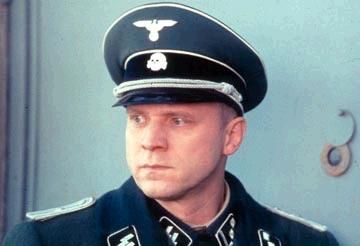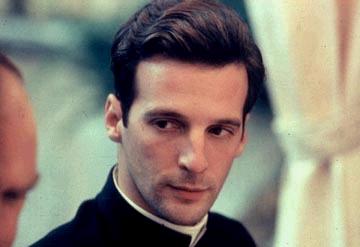

World War II is just beginning, and Kurt Gerstein (Ulrich Tukur, Taking Sides, Hunters in the Snow) is a rising soldier in the SS. He is a strong Christian man who abhors the Nazi party but still is a member. His specialty is purifying water, and he developed Zyklon B, a powerful chemical compound that can purify the dirtiest water so that soldiers on the battlefield can have drinking water. So begins Amen, based on the play by Rolf Hochhuth, a movie that is never quite sure what it wants to be. At best, it is a stinging indictment of the Catholic Church, and it's refusal to do anything about the Holocaust.
Gerstein find himself rising faster, and that Zyklon B is being used to kill Jews. This horrifies him. He finds it against everything he believes in, and tries his best to tell the people around him. Everybody heard the rumors, but they still believe that the Jews are going to labor camps to work. Nobody believes Gerstein. The local Catholic Church official rebuffs him too, but Riccardo Fontana (Mathieu Kassovitz, Amelie, Birthday Girl), a Jesuit priest with Vatican connections, takes an interest. He is just as disgusted as Gerstein.
Director Costa-Gavras (Mad City, Lumiere and Company) then looks at events on two fronts. Gerstein, now with a lot of authority, does what he can to save Jewish lives in an indirect manner. He constantly rejects shipments of the chemicals, stating they are unacceptable. At the Vatican, Fontana does what he can to notify the Pope. Everybody there is sympathetic, but wants more proof before they will act. Even when Fontana offers more proof in the form of Gerstein, the Vatican is reluctant. Tukur does a good job of portraying Gerstein, angry at himself at not being able to do more. His frustration is palpable, and it affects him in detrimental ways. Kassovitz is probably wrong for the role of Fontana. He constantly looks confused, and is not able to ably demonstrate the turmoil that Fontana feels.
Amen never attains the level where there is a sense of urgency. It relies on the fact that the events of the Holocaust are seared into the minds of the viewer to generate most of the emotion in the film, instead of having the story itself do the work. Costa-Gavras and Jean-Claude Grumber's (Fait d'Hiver, The Happiest Place on Earth) script is much better at examining how this heavy burden affects each character. As the movie progresses, Gerstein and Fontana lose their composure and become more desperate. Thousands of people are dying each day, and the people around them do not seem to care. One cannot help but wonder why nobody notices Gerstein's increasingly erratic behavior, or questions his extreme inefficiencies. At the same time, it's baffling understanding why the Vatican did nothing with what it knew.